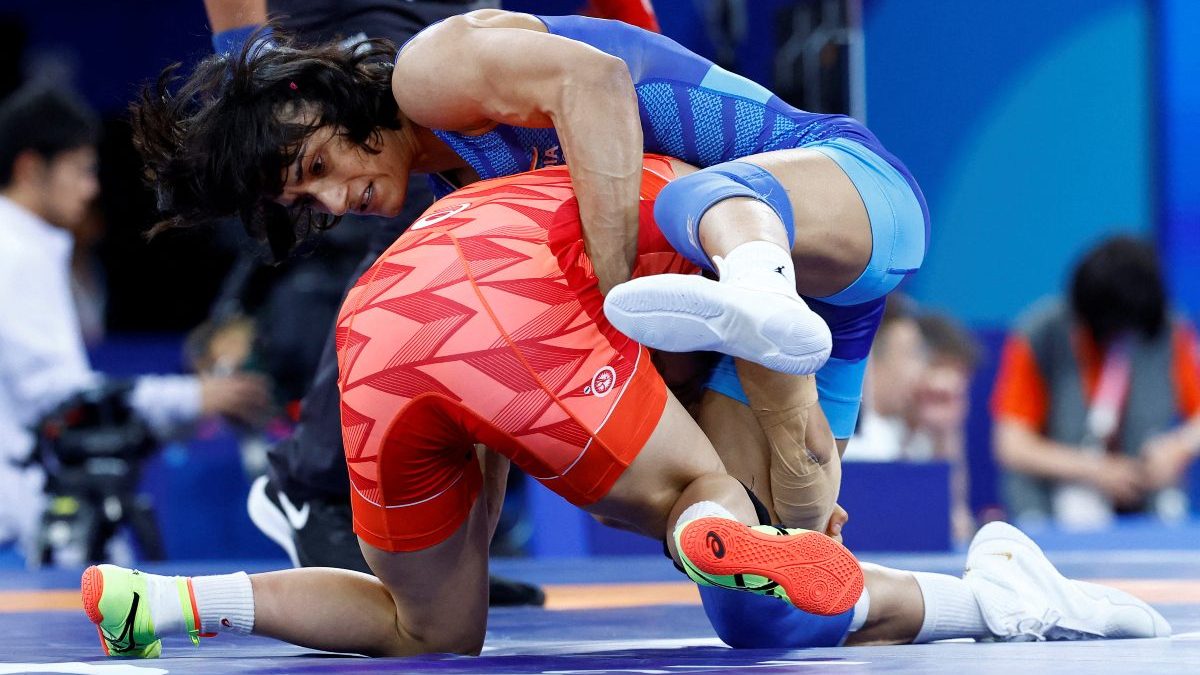Court of Arbitration for Sport (CAS) presented their reasons behind dismissing Vinesh Phogat’s appeal to be awarded a silver medal for reaching the Paris Olympics final. read more
)
Vinesh Phogat was found to be 100 grams overweight ahead of her Paris Olympics final. Reuters
The Court of Arbitration for Sport (CAS) has published a detailed explanation into the decision to reject Vinesh Phogat’s appeal by its ad-hoc division. The sole arbitrator, Annabelle Bennett, had rejected Phogat’s appeal against a gut-wrenching disqualification from the Paris Olympics final for being 100 grams overweight.
The 29-year-old Vinesh was disqualified on the morning of the women’s 50kg freestyle final.
The decision on her appeal was announced after three postponements.
What was Vinesh Phogat’s appeal?
In her appeal, Vinesh Phogat had demanded that she be given a joint silver with Cuba’s Yusneylis Guzman Lopez, who lost to her in the semifinals but was promoted to the final following Vinesh’s disqualification.
The gold was claimed by USA’s Sarah Ann Hildebrandt.
“The Applicant seeks an order that all the effects of her failure to pass the second weigh-in be set aside and that she be given a silver medal,” said the CAS explanation.
What was Vinesh Phogat’s argument in the appeal?
Vinesh and IOA, who were part of the appeal as an “interested party”, reasoned with the arbitrator: “The Athlete fought three difficult competitions on 6 August 2024 and needed to eat and drink for her health.”
“There was a short time between bouts, due to the distance between the venue and the Athletes’ Village which left the Applicant with little time for the process of losing weight before the second weigh-in the following morning.”
“The Athlete did not herself raise the relevance of menstruation, but there is evidence that she was pre-menstrual and that this results, as a normal biological process, in fluid retention. The IOA submits that “the biological difference in the bodies of male and female wrestlers, particularly in light of the menstruation of women, needs to be taken into account whilst determining the eligibility of female wrestlers on the second day of the weigh-in”. The IOA has produced a medical certificate dated 8 August 2024 to the effect that the Athlete is “currently” in her pre-menstrual phase and cited medical literature on body weight changes during menstruation.”
Read | Vinesh Phogat first statement on CAS appeal dismissal
“The evidence regarding the effects of the menstrual cycle does not distinguish between the first weigh-in, when she was compliant, and the second weigh-in, when she was not. While it may be the case that the Athlete experienced some bloating and water retention, this is unquantified and, as a condition that may occur during the menstrual cycle, would be expected to be a factor that was mitigated against to ensure that the Athlete remained below the weight limit. "
Why CAS dismissed the appeal by Vinesh Phogat?
“The problem for the Athlete is that the Rules are clear as to the weight limit and are the same for all participants. There is no tolerance provided for — it is an upper limit. It does not even allow for the weight of the singlet. It is clearly up to an athlete to ensure that they remain below that limit,” the CAS said.
“There is no dispute that the Applicant was above the weight limit. She gave the above evidence clearly and directly at the hearing. Her case is that the amount of excess was 100g and that a tolerance should apply as this is a small excess and explicable for reasons such as drinking water and water retention, in particular during the pre-menstrual phase.”
CAS ruled that there was no “wrongdoing” on Vinesh Phogat’s part for missing the weigh-in.
“The Sole Arbitrator observes that the Athlete entered the field of play and fought and won three rounds and reached the final of the 50 kg wrestling competition at the Paris Olympic Games before she failed the second weigh-in and was ineligible to compete in the final. There is no suggestion of any wrongdoing on her part.”
What did CAS say on a joint or additional silver medal?
CAS said in their statement that the responsibility of awarding medals rests with the International Olympic Committee (IOC) and not with them or the Sole Arbitrator.
“The Applicant has not sought that anyone be deprived of a medal. She has sought an order from the CAS that she be granted a second silver medal. The other Parties in this proceeding have submitted that this is not an available order and not within the power of the Sole Arbitrator to grant that relief, with which the Sole Arbitrator agrees. The Sole Arbitrator does not have the power to award medals. That rests with the IOC. The silver medal and the bronze medals have been awarded. There is no provision in the Rules for the awarding of a second silver medal.”
“By reason of Rule 56(1) of the Olympic Charter, any decision regarding the awarding, withdrawal or reallocation of any victory medal or diploma falls within the sole authority of the IOC. The IOC, in turn, awards medals at the Olympic Games on the basis of rankings established by the International Federations (Rule 46 of the Olympic Charter). The Sole Arbitrator cannot make an order that the IOC give the Applicant an additional silver medal.”
IOC argued that only the two finalists win medals - gold and silver - for competing at the Olympics. Since Vinesh Phogat did not “take part”, she could not be awarded a medal.
“IOC contends that, by Article 8 of the Rules, the two finalists in the elimination rounds take part in the match for first and second places and that the Applicant did not “take part” in such match. Thus, the IOC’s position is that she is not entitled to claim that she ranked second, either instead of or alongside the silver medal awardee.”
What did CAS say on UWW rules regarding weigh-ins?
Proposed Immediate Rule Changes for UWW:
1.) 1kg second Day Weight Allowance.
2.) Weigh-ins pushed from 8:30am to 10:30am.
3.) Forfeit will occur in future finals if opposing finalist misses weight.
4.) After a semifinal victory, both finalists’ medals are secured even if…
CAS verdict explanation seemed to concur with former wrestling champion Jordna Burroughs who argued for a change in weigh-in rules. The six-time world champion and Olympics gold medallist had porposed a one-kg second day weight allowance, pushing the time for the day two weigh-ins and an assured medal for a finalist even if they fail to cut weight on the second day.
CAS said the decision to bar wrestlers from competing on the second day was “draconian” since they were missing weigh-ins naturally and not due to illegal or wrongful acts.
“The consequences of the failed second weigh-in, which do not arise from any illegal or wrongful act on the part of the Applicant are, in the opinion of the Sole Arbitrator, draconian.
“A consequence of elimination without ranking from the round for which the Athlete was found ineligible, having been eligible for the rounds for which she competed, would seem to be a fairer solution. However, it bears repeating that neither the formation or validity of UWW policy is before the Sole Arbitrator and there is no evidence or submission as to the reasons for such policy.”

 1 month ago
6
1 month ago
6
)
)
)
)
)
)
)
)
)
)
)
)
)
)
)
)
)
)
)
)
)
)
)
)
)
 English (US) ·
English (US) ·